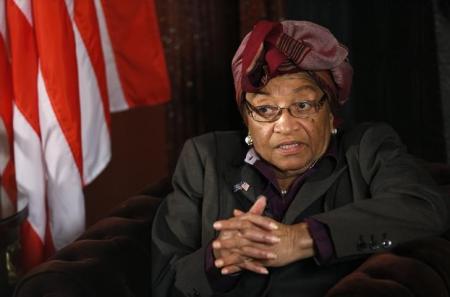Liberian President Ellen Johnson Sirleaf has lifted the state of emergency imposed to control an Ebola outbreak that has ravaged the country.
She said the move did not mean “the fight is over”, although numbers of new infections were no longer increasing.
The confirmed death toll from the virus is now 5,160 people, almost all of them from Liberia, Guinea and Sierra Leone.
Meanwhile, clinical trials to find an effective treatment for Ebola are due to start in West Africa next month.
The medical charity Medicins Sans Frontieres (MSF), which has been helping lead the fight against the virus, says three of its treatment centres will host three separate research projects.
‘New hotspots’
In nationwide address, President Johnson Sirleaf said that night curfews would be reduced and weekly markets could take place across Liberia.
She added that preparations were being made for the re-opening of schools.
The state of emergency imposed in August had allowed the local authorities to curb movement in the worst-hit areas of the country, including the capital Monrovia.
The lifting of the emergency comes after the World Health Organization (WHO) said “there is some evidence that case incidence is no longer increasing nationally in Guinea and Liberia”.
However, some reports suggest that new fresh hotspots have emerged in Liberia, the Associated Press reports.
‘Hope for patients’
In a separate development, MSF announced the new clinical trials: two in Guinea and another one in an unconfirmed location.
One trial will involve using the blood of recovered Ebola patients to treat sick people in the Guinean capital Conakry.
“This is an unprecedented international partnership which represents hope for patients to finally get a real treatment,” said MSF spokeswoman Dr Annick Antierens.
About 400 people will take part in the trials, and they will be extended to other centres if the early results – expected in February 2015 – are promising.
The WHO announced in September that experimental treatments and vaccines for Ebola should be fast-tracked.
Two experimental vaccines, produced by GlaxoSmithKline (GSK) and the Public Health Agency of Canada, have already been fast-tracked into safety trials.
The GSK vaccine is being tested in Mali, the UK and the US. Research on the Canadian vaccine is also under way in the US.
Source: BBC


